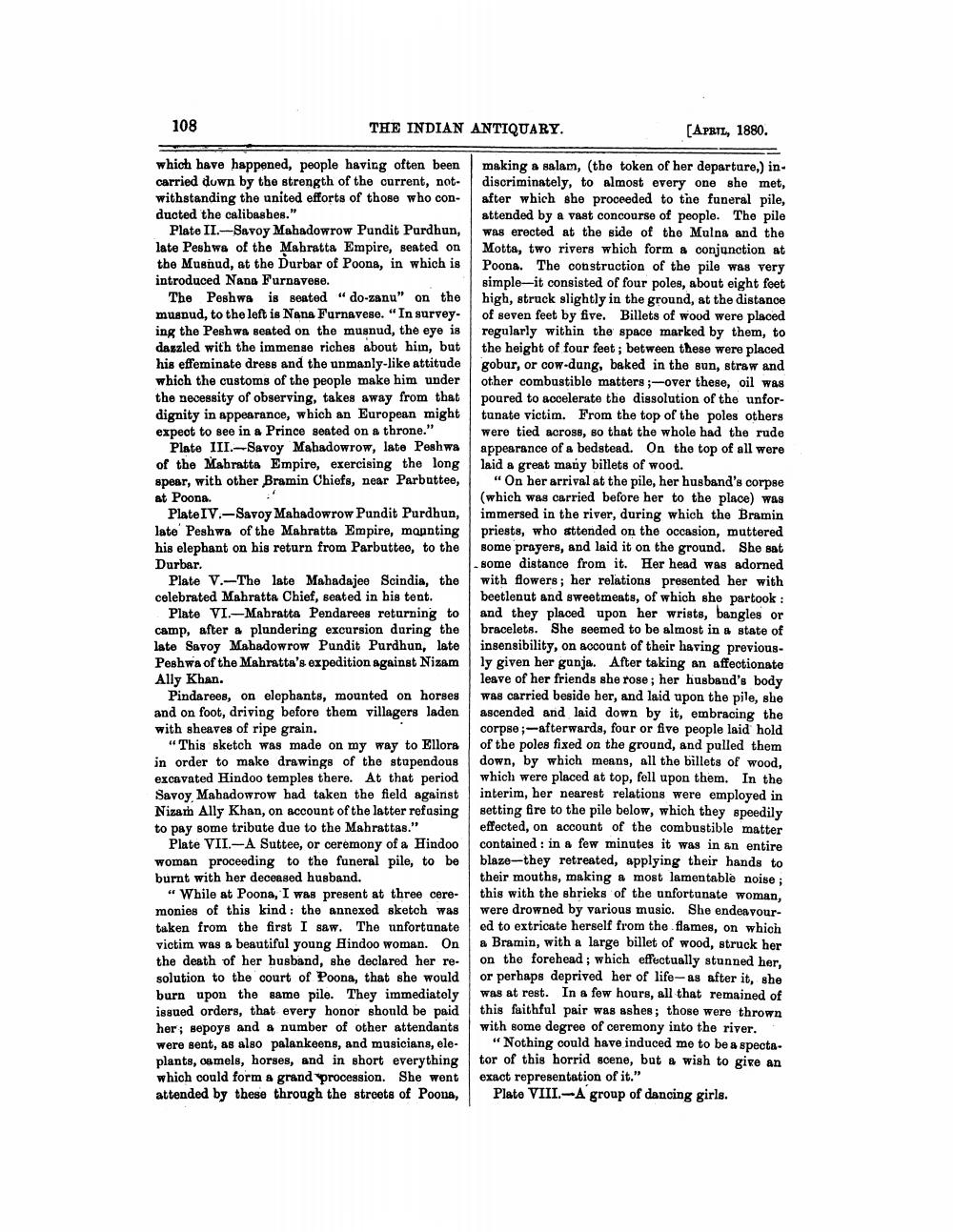________________
108
THE INDIAN ANTIQUARY.
which have happened, people having often been carried down by the strength of the current, notwithstanding the united efforts of those who conducted the calibashes."
Plate II.-Savoy Mahadowrow Pundit Purdhun, late Peshwa of the Mahratta Empire, seated on the Musnud, at the Durbar of Poona, in which is introduced Nana Furnavese.
The Peshwa is seated "do-zanu" on the musnud, to the left is Nana Furnavese. "In surveying the Peshwa seated on the musnud, the eye is dazzled with the immense riches about him, but his effeminate dress and the unmanly-like attitude which the customs of the people make him under the necessity of observing, takes away from that dignity in appearance, which an European might expect to see in a Prince seated on a throne."
Plate III.-Savoy Mahadowrow, late Peshwa of the Mahratta Empire, exercising the long spear, with other Bramin Chiefs, near Parbuttee, at Poona.
Plate IV. Savoy Mahadowrow Pundit Purdhun, late Peshwa of the Mahratta Empire, mounting his elephant on his return from Parbuttee, to the Durbar.
Plate V.-The late Mahadajee Scindia, the celebrated Mahratta Chief, seated in his tent.
Plate VI.-Mahratta Pendarees returning to camp, after a plundering excursion during the late Savoy Mahadowrow Pundit Purdhun, late Peshwa of the Mahratta's expedition against Nizam Ally Khan.
Pindarees, on elephants, mounted on horses and on foot, driving before them villagers laden with sheaves of ripe grain.
"This sketch was made on my way to Ellora in order to make drawings of the stupendous excavated Hindoo temples there. At that period Savoy Mahadowrow had taken the field against Nizam Ally Khan, on account of the latter refusing to pay some tribute due to the Mahrattas."
Plate VII.-A Suttee, or ceremony of a Hindoo woman proceeding to the funeral pile, to be burnt with her deceased husband.
"While at Poona, I was present at three ceremonies of this kind: the annexed sketch was taken from the first I saw. The unfortunate victim was a beautiful young Hindoo woman. On the death of her husband, she declared her resolution to the court of Poona, that she would burn upon the same pile. They immediately issued orders, that every honor should be paid her; sepoys and a number of other attendants were sent, as also palankeens, and musicians, eleplants, camels, horses, and in short everything which could form a grand procession. She went attended by these through the streets of Poona,
[APRIL, 1880.
making a salam, (the token of her departure,) indiscriminately, to almost every one she met, after which she proceeded to the funeral pile, attended by a vast concourse of people. The pile was erected at the side of the Mulna and the Motta, two rivers which form a conjunction at Poona. The construction of the pile was very simple-it consisted of four poles, about eight feet high, struck slightly in the ground, at the distance of seven feet by five. Billets of wood were placed regularly within the space marked by them, to the height of four feet; between these were placed gobur, or cow-dung, baked in the sun, straw and other combustible matters;-over these, oil was poured to accelerate the dissolution of the unfortunate victim. From the top of the poles others were tied across, so that the whole had the rude appearance of a bedstead. On the top of all were laid a great many billets of wood.
"On her arrival at the pile, her husband's corpse (which was carried before her to the place) was immersed in the river, during which the Bramin priests, who attended on the occasion, muttered some prayers, and laid it on the ground. She sat some distance from it. Her head was adorned with flowers; her relations presented her with beetlenut and sweetmeats, of which she partook : and they placed upon her wrists, bangles or bracelets. She seemed to be almost in a state of insensibility, on account of their having previously given her gunja. After taking an affectionate leave of her friends she rose; her husband's body was carried beside her, and laid upon the pile, she ascended and laid down by it, embracing the corpse;-afterwards, four or five people laid hold of the poles fixed on the ground, and pulled them down, by which means, all the billets of wood, which were placed at top, fell upon them. In the interim, her nearest relations were employed in setting fire to the pile below, which they speedily effected, on account of the combustible matter contained: in a few minutes it was in an entire blaze-they retreated, applying their hands to their mouths, making a most lamentable noise; this with the shrieks of the unfortunate woman, were drowned by various music. She endeavoured to extricate herself from the flames, on which a Bramin, with a large billet of wood, struck her on the forehead; which effectually stunned her, or perhaps deprived her of life-as after it, she was at rest. In a few hours, all that remained of this faithful pair was ashes; those were thrown with some degree of ceremony into the river.
"Nothing could have induced me to be a spectator of this horrid scene, but a wish to give an exact representation of it."
Plate VIII-A group of dancing girls.




